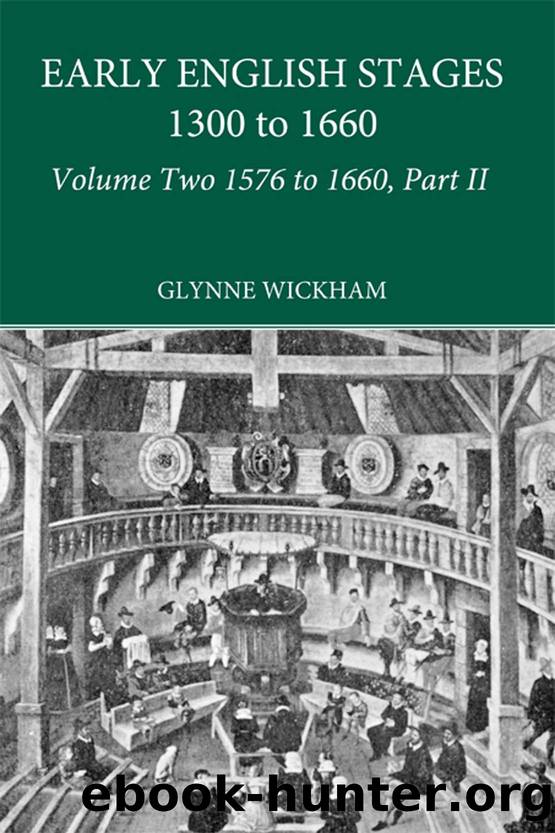Part II - Early English Stages 1576-1600 by Wickham Glynne;

Author:Wickham, Glynne;
Language: eng
Format: epub
Publisher: Taylor and Francis
4 Abortive Theatre Projects: John Wolf’s Playhouse, Porters’ Hall, the Anatomy Theatre and D’Avenant’s theatres before 1660
The zest for theatre building in Jacobean and Caroline London is illustrated by attempts to establish several new playhouses in or near the city, none of which was ever fully realized. All of them, however, deserve mention in this narrative as they help to throw some light on relations between the sovereign and the Privy Council on the one hand and the Lord Mayor and Aldermen on the other in their efforts to reach a modus vivendi with the actors and their business associates, following the Privy Council Order of July 1597.
The first of these ventures was initiated by a London Stationer, John Wolf of East Smithfield, who appears to have tried to steal a march on Edward Alleyn in building a new playhouse on the North Bank in 1600. The site chosen was in Nightingale Lane, East Smithfield, as near to the city bars in the direction of Clerkenwell as the planners of the first Fortune intended it to be to those in White Cross Street, and a start at least was made on building it.61 On 9 March, however, orders were sent from the Privy Council to the Justices of Middlesex aimed at stopping the building of the first Fortune. The letter concludes, ‘wee require you not to faile forthwith to take order that the forsaid intended buildinge maie be staied, and yf any be begone, to see the same quite defaced’.62 We have already seen how Alleyn, with the assistance of the Earl of Nottingham, overcame this obstacle to their intentions: John Wolf was not as lucky, for on 1 April he was served with an injunction from the Middlesex Magistrates to the effect that he ‘do not proceede anie further in buildinge or erectinge of the same play-howse’63 without special licence from the Privy Council. Since nothing more is heard of this playhouse it is to be presumed he did not get it. However this cannot be taken to mean that no plays were ever presented there. In December 1601, the Privy Council is again writing to the Middlesex magistrates complaining that their former orders, ‘so farr from takinge dew effect, as in steede of restrainte and redresse of the former disorders the multitude of play howses is much encreased’.64 Suspicion arises that one of the places complained of was the house in Nightingale Lane when account is taken of an entry in the Gaol Delivery Register of the Middlesex magistrates for 20 December 1608, committing James Waters of East Smithfield, an ironmonger, and William Claiton of East Smithfield, victualler, together with Daniel Hitch, yeoman of Whitechapel, to pay twenty pounds each as surety for William Claiton’s appearance at the next Sessions ‘to answer for sufferinge playes to bee played in his house in the night season’.65
Since by this time the Red Bull had been built and licensed at the other end of Clerkenwell we may sympathize with those inhabitants of East Smithfield whose initiatives were thus twice frustrated.
Download
This site does not store any files on its server. We only index and link to content provided by other sites. Please contact the content providers to delete copyright contents if any and email us, we'll remove relevant links or contents immediately.
| Dance | Individual Directors |
| Magic & Illusion | Reference |
| Theater |
Call Me by Your Name by André Aciman(19873)
Ready Player One by Cline Ernest(13939)
How to Be a Bawse: A Guide to Conquering Life by Lilly Singh(7142)
Wiseguy by Nicholas Pileggi(5294)
The Kite Runner by Khaled Hosseini(4937)
On Writing A Memoir of the Craft by Stephen King(4647)
Audition by Ryu Murakami(4595)
The Crown by Robert Lacey(4557)
Call me by your name by Andre Aciman(4459)
Gerald's Game by Stephen King(4355)
Harry Potter and the Cursed Child: The Journey by Harry Potter Theatrical Productions(4301)
Dialogue by Robert McKee(4145)
The Perils of Being Moderately Famous by Soha Ali Khan(4055)
Dynamic Alignment Through Imagery by Eric Franklin(3900)
Apollo 8 by Jeffrey Kluger(3496)
How to be Champion: My Autobiography by Sarah Millican(3489)
The Inner Game of Tennis by W. Timothy Gallwey(3450)
Seriously... I'm Kidding by Ellen DeGeneres(3398)
Darker by E L James(3394)
